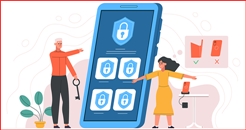 Giving parents authority over children's social media
Giving parents authority over children's social media
From an article by the Institute of Family Studies
One of the US States, Utah, has passed an encouraging law on social media which may be an example for governments to follow. The law gives full administrator-level access to parents, so that they can see everything that their children are doing, or receiving, or seeing on social media.
It marks a watershed for how technology companies are able to intrude upon family life. Should families have authority over their technologies or should technology have authority over families? This question is critical to answer given the link between social media and the teen mental health crisis, and with technological advances in artificial intelligence and the so-called metaverse that promise to be even more powerful. With the Social Media Regulation Act (SMRA), Utah has given parents more power over technology’s reach into their children's lives.
The legislation empowers parents by requiring parental consent for any minor in Utah to open or operate a social media account. This also requires, then, that users of social media in Utah have to verify their age, and if they are under the age of 18, a parent has to provide parental consent for them to have an account. The law also creates certain protections for minor accounts: that they're not to appear in search results, or be targeted for advertising, or have their user data and personal information collected or shared, and that they are not able to receive direct messages from adult accounts that they aren't "friends” with already.
So, it prevents social media from being as aggressive in targeting kids with advertising or suggesting groups or posts to them, which is how we know these apps work—by their algorithms that are really aggressive towards children. And then it also will require social media companies to automatically shut down minor accounts between 10:30 pm to 6:30 am, to ensure that children are getting the proper sleep they need. It is essentially an overnight shutdown of social media for minors. This is important, since sleep deprivation has been shown to be a very likely mechanism for the mental health effects we're seeing from social media, such as depression and anxiety.
What the bill also does is give full administrator-level access to parents, so that they can see everything that their children are doing, or receiving, or seeing on social media. It creates a private right of action so that parents are able to hold these Big Tech companies accountable for harms to their children. It gives them a right to sue for damages—on behalf of their teens—for harms caused by addiction and other design features, from social media companies, and it has shifted the burden of proof to the social media companies to prove that a harm has not been done.
The bill also empowers Utah's Division of Consumer Protection to investigate social media companies for design harms, which can cause addiction in minors, and to levy fines against those companies for violations.
The Terms of Service for a social media account is essentially a contract. Case law indicates that parents can be held responsible for enforceable contracts that their children enter in to. Therefore, parents have an undeniable interest in controlling and overseeing with whom and when their children enter into contracts. So, it's a very reasonable response to have a regulation in Utah that now requires parental consent for children to form these online contracts, because creating a social media account is forming an online contract with that company. Parents, therefore, should have the right to consent for their child to enter into a contract and open a social media account.
The more governments that step up and pass these types of laws will really force the Big Tech companies to change the way that they do business, in a way that better protects our children and empowers parents.
Read the full article here.
Retweet about this article:
From an article by the Institute of Family Studies, 30/05/2023